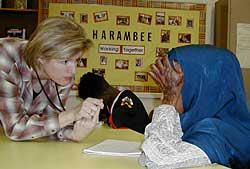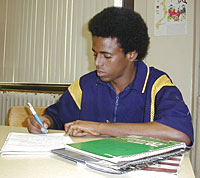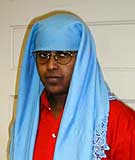
One Size for All?
by Tim Pugmire
February 11, 2000
Many teachers in Minnesota say the state's high school graduation standards pose an enormous challenge for recent immigrants and special education students. The number of students in these categories is growing, especially in Minneapolis and Saint Paul schools. Minnesota's graduation rule allows some accommodations for non-English speakers and students with various disabilities. But teachers say the state's requirements for a high school diploma may still remain out of reach for many students.
| |
|
|
|
||
Smaby: It's a great language-building exercise because they have to speak to each other and understand each other. And it gets them talking and using the words in English that they need to know for conversation.But before earning a diploma, these foreign-born students must also show they can read and write well in the English language. All Minnesota students must pass basic-standards tests before graduation in reading, math and writing. However, new immigrants can delay the tests up to three years. Tenth-grader Tahir Hassan has been in the United States just 11 months, but the Ethiopian immigrant says he feels ready to take the tests.
Hassan: I think I do good as a student in the class. I like to follow everything that teacher say, and do it well. If I lost one point, I'm going to get angry and mad at myself.More than 28,000 students in Minnesota public schools are designated as Limited English Proficient, or LEP; most are enrolled in Minneapolis and Saint Paul. At Roosevelt, more than 600 of the school's 1,500 students are LEP. The majority are from Somalia, with new arrivals enrolling weekly.
| |
|
|
|
||
The state allows LEP students to take the basic-standards math test in their native language. But few Minnesota students have taken that option, and Roosevelt High School has never used a translated math test. School officials say the reason is many new students are not literate in their native language.
Ayeh: Basically, what they're dealing with is the students who have no schooling whatsoever.Ibrahim Ayeh is the coordinator of educational programs for Somali students in Minneapolis schools. He says many of the young Somali refugees missed all or part of their education due to the civil unrest in their homeland.
Ayeh: Think about the students who have been placed at the high school without any schooling. What they need is almost everything. They will be functioning, for example, at the intermediate or elementary level, and yet they have to pass basic-standards tests and they have to also do their high-standard performance.Those high-standard performances, known as the Profile of Learning, are also required for graduation. Under the profile, students must show what they know in 10 broad learning areas.
Jessie Montano, assistant commissioner of the Department of Children, Families and Learning, says the standards ensure all students leave high school with basic literacy, and she says some students will need more than four years in high school to get the job done.
Montano: If I'm a student that's arrived here at the ninth grade, then the responsibility of that district is to sit down with that student and say, "Here's what you have to do to graduate, and there's nothing magic about four years."But the state does provide some accommodations to help smooth the way for LEP students. Under the Profile of Learning rules, LEP students can choose to tackle most of the standards in their native language. Montano says the profile lesson plans, known as performance packages, can be translated and reading assignments simplified for LEP students.
Montano: Because the object that we're trying to measure is: can that student apply the knowledge and information. And so we would be looking at designing a performance package, or the teacher would be looking a performance package, that would allow the student to demonstrate.
| |
|
|
|
||
Special-education students can also use alternative testing formats, such as large print or tape-recorded instructions. Some students are allowed a lower passing score.
There are more than 110,000 special-education students in Minnesota, with a wide range of learning abilities. The state's Jessie Montano says special-education teachers have received extensive training on adapting the standards for those various abilities. But some of those teachers are still scratching their heads about the new system.
Seif: I don't think anybody has really thought through the special-ed implications with this.Michele Seif coordinates special-education programs for nearly 200 students at Minneapolis Roosevelt. While the mainstream 10th graders at this urban school wade through the new graduation standards, special education students largely remain on the sidelines. Seif says the paperwork alone for the modifications is frightening. She says she's still not sure how the high standards fit in special education.
Seif: I think that students should be aware of humanities, of art, of music. They should have higher thinking skills where they can do judgement and create projects on their own. I'd love to see that for all kids. But I'm concerned that many won't be able to do them.State education officials stress the graduation standards do apply to all Minnesota students. They say school districts need to move faster to get the requirements in place with necessary adjustments for special populations. But those inclusive expectations may be driving away some students.
| |
|
||||||||||||||||||||||||||||||||||||
|
|||||||||||||||||||||||||||||||||||||
| |
|||||||||||||||||||||||||||||||||||||
Vana: We could actually have some kids who can't pass that reading test who have 4.0 averages. And the state would say to us, "Well, how could you pass them in a class?" Well, because we're teaching them in their native language. So, they know their science, they know their social studies, but we're not doing it in English with them. And then they go onto the university and they're doing just fine.Vana says he's encouraged by the Department of Children, Families and Learning's effort to develop a new test, which will more accurately measure LEP students' emerging English skills and overall academic abilities. There's also been talk among some lawmakers on whether to extend the three-year testing exemption for new immigrants.



